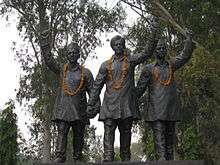Sukhdev Thapar
| Sukhdev Thapar | |
|---|---|
 | |
| Born |
15 May 1907 Ludhiana, Punjab, British India |
| Died |
23 March 1931 (aged 23) Lahore, British India, (now in Punjab, Pakistan) |
| Nationality | Indian |
| Organization | Hindustan Socialist Republican Association |
| Movement | Indian Independence movement |
Sukhdev Thapar (15 May 1907 – 23 March 1931) was an Indian revolutionary. He was a senior member of Hindustan Socialist Republican Association. He was hanged on 23 March 1931 at the age of 23.
Early life
Sukhdev Thapar, in Ludhiana, Punjab born in Ludhiana, Punjab, British India to Ramlal Thapar (father) and Ila Devi. Sukhdev's father died and he was brought up by his uncle Lala Achintram.[1]
Revolutionary activities
Sukhdev Thapar was a member of the Hindustan Socialist Republican Association (HSRA), and organised revolutionary cells in Punjab and other areas of North India.
Sukhdev is best remembered for his involvement in the Lahore Conspiracy Case of 18 December 1928 and its aftermath. He was an accomplice of Bhagat Singh, and Shivaram Rajguru, whose conspiracy led to the assassination of Deputy Superintendent of Police, J. P. Saunders in 1928 in response to the violent death of a veteran leader, Lala Lajpat Rai. After the Central Assembly Hall bombings in New Delhi on 8 April 1929, the conspirators were arrested and convicted of their crime.[2]

On 23 March 1931, the three men were hanged. Their bodies were secretly cremated on the banks of the Satluj river.
References
- ↑ Pramod Maruti Mande (2005). Sacred offerings into the flames of freedom. Vande Mataram Foundation. p. 251. ISBN 978-81-902774-0-2.
- ↑ Subhadra Sen Gupta (July 2007). A Flag, A Song & a Pinch of Sa. Penguin Books India. pp. 169–. ISBN 978-0-14-333042-4.
Further reading
- Noorani, Abdul Gafoor Abdul Majeed (2001) [1996]. The Trial of Bhagat Singh: Politics of Justice. Oxford University Press. ISBN 0195796675.